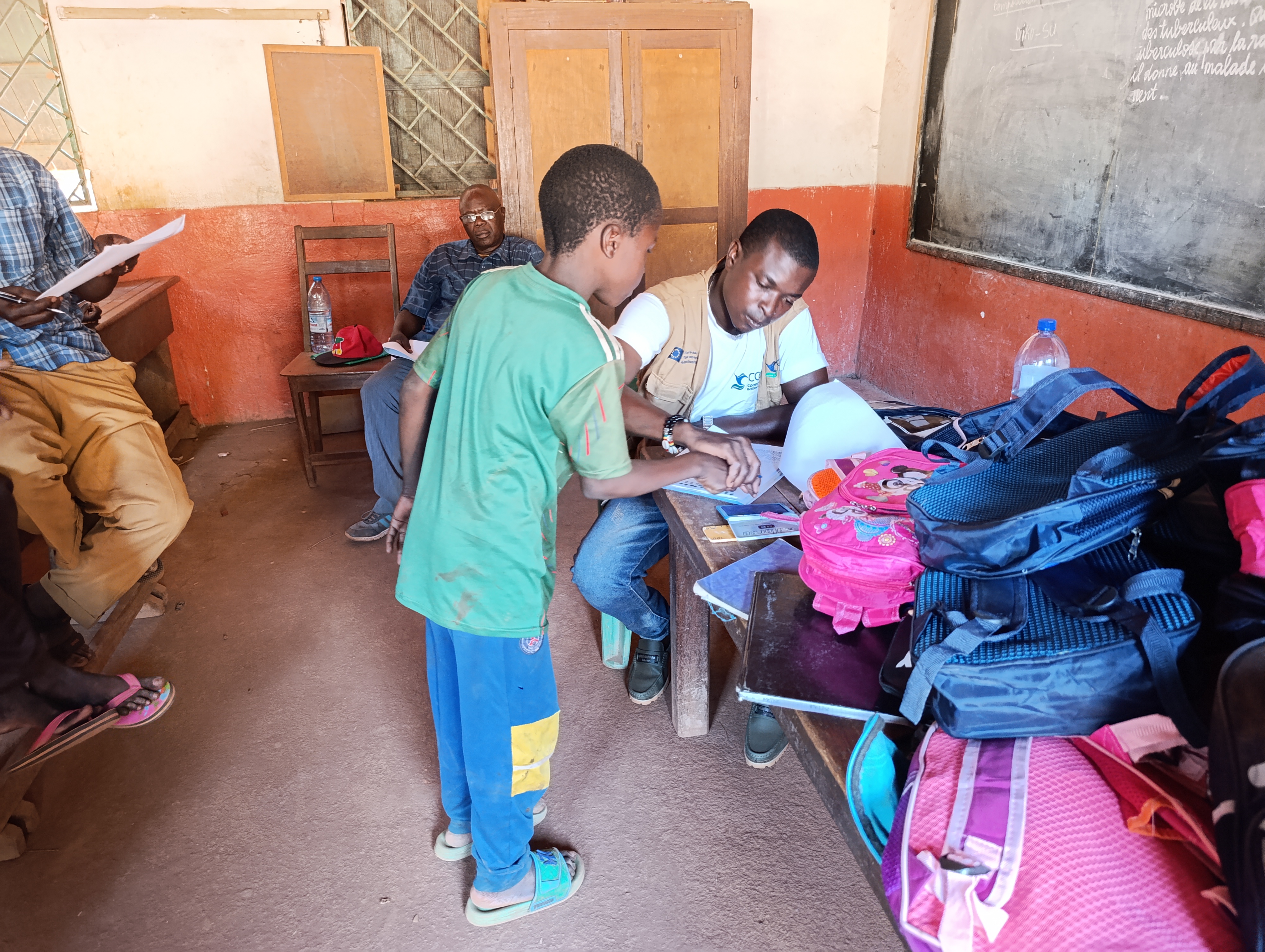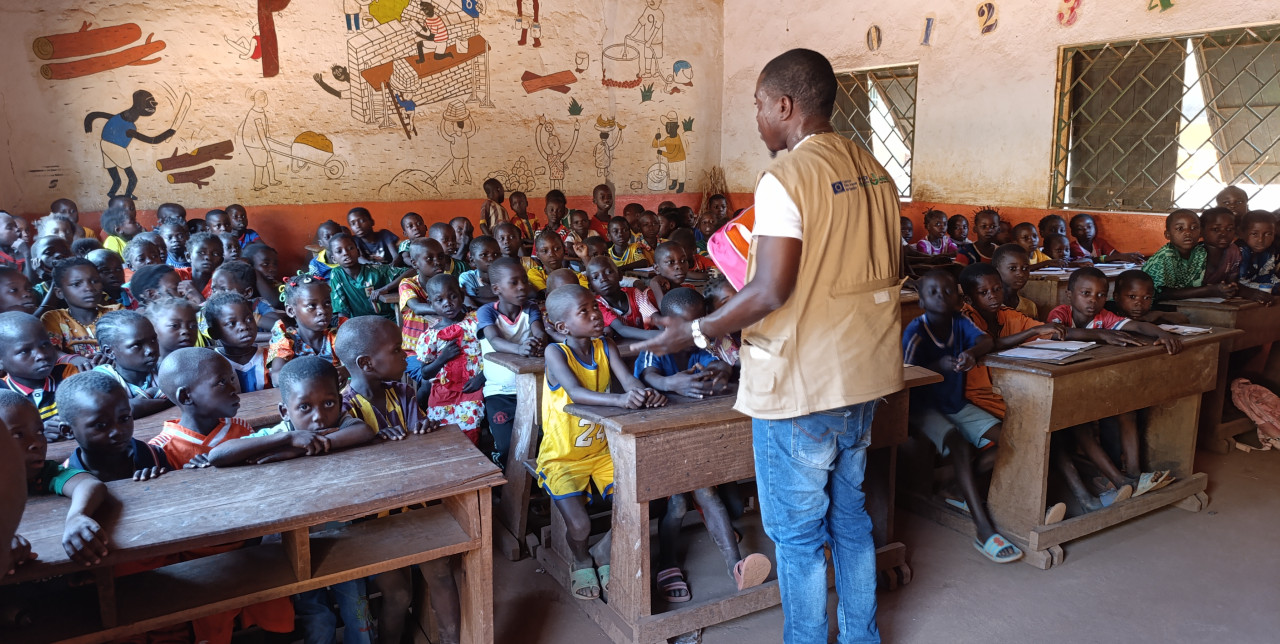19-06-2025 | di COOPI
CAR: reopening doors to education with accelerated learning Programme
The Ouham-Pendé prefecture, one of the fourteen in the Central African Republic, is currently at the center of a severe escalation of violence. Ongoing armed conflicts are undermining the fundamental rights of the civilian population, with children and youth among the most affected victims, being deprived of their right to education. In response to this crisis, COOPI – Cooperazione Internazionale, with funding from European Humanitarian Aid (ECHO), has launched an Accelerated Learning Program as part of the project “Integrated emergency response to support accessible, inclusive, quality and protective education for the most vulnerable populations affected by the crisis in the Central African Republic.” This assistance targets displaced children and youth who are out of school, have dropped out, or no longer have access to the formal education system in the areas of Obo, Zémio, Mboki, and Bozoum, offering a rapid, context-specific educational response suited to the emergency setting.
A rapid educational response in a shifting crisis
Since February 27, 2025, the situation in Ouham-Pendé has sharply deteriorated due to a new wave of violence involving transhumant armed groups, 3R militias, and local self-defense forces along the Bozoum–Bouar and Bozoum–Bocaranga axes. Hundreds of families have fled to central Bozoum, settling in improvised reception sites or hosted by local families.
As soon as they arrived on the ground, COOPI and ECHO activated a rapid intervention to assess the educational situation. As detailed in a previous article, on March 19, 2025, in partnership with APADE, a rapid assessment was conducted in Bozoum’s main displacement sites to understand the urgent needs of children affected by the conflict. The assessment revealed that approximately 950 students were out of school, 30 displaced teachers lacked the tools to teach, and the existing schools were overcrowded and in poor sanitary conditions. In response, COOPI quickly activated an emergency response mechanism to ensure educational continuity at the reception sites. However, the need for a more structured educational intervention for out-of-school children soon became evident, leading to the launch of the Accelerated Learning Program.
The accelerated learning program: a bridge back to school
The Accelerated Learning Program (ALP) is an emergency educational response designed for displaced children and adolescents who have dropped out of school or have never accessed formal education. The ALP offers a flexible learning path tailored for overage learners compared to the regular school cycle. This program enables students to catch up on basic skills and obtain a certificate that facilitates reintegration into the formal school system, planned for the 2025–2026 academic year.
Currently, the program is active in three displacement sites in the city of Bozoum, reaching 256 children — 116 girls and 140 boys — under the coordination of the Ouham-Pendé Academic Inspectorate. In addition to ensuring access to learning, the ALP provides a safe and protective space where children can regain stability, socialize, and experience a sense of normalcy.

Integrated educational interventions in crisis settings
Alongside the launch of the Accelerated Learning Program, COOPI has distributed school and teaching kits across four displacement sites in Bozoum. Schools such as Bakanja, Plateau, Gbago, and Sangbai have welcomed students displaced from conflict-affected villages like Boforo, Hai, Koundé, Kparé, Bogala, Bara, and Bahoyo. In total, 895 displaced students — 330 girls and 565 boys — received essential school materials including backpacks, pencils, notebooks, pens, colored pencils, and chalk. Meanwhile, 16 teachers received didactic kits to support quality teaching in challenging conditions. Through these complementary actions, COOPI works to uphold the right to education in a crisis context, promoting an inclusive, safe, and protective school environment where every child can begin to rebuild their future.
COOPI – Cooperazione Internazionale has maintained a continuous presence in the Central African Republic since 1974, implementing emergency and development projects primarily in the sectors of protection, education in emergencies, and food security. Since May 2024, the project “Integrated emergency response to support accessible, inclusive, quality, and protective education” has aimed to prevent and reduce the disruption of formal education for school-aged children, promoting an integrated approach that also seeks to improve the health conditions of children and their communities.




 Central African Republic
Central African Republic